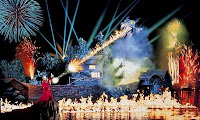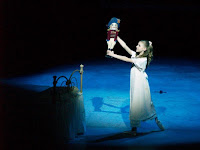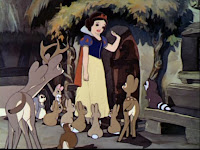 The page expresses common criticisms of melodrama that's made purposefully shallow and simple to showcase fight scenes and explosions.
The page expresses common criticisms of melodrama that's made purposefully shallow and simple to showcase fight scenes and explosions."In fact, a plot with too much 'density' can be an impediment...The art becomes the story, as in tapestries".
Professorial types and other high minded people with a literate bent HATE these things, at first glance, you'd think they might be right.



 As the attitude seems to dictate, real storytelling brings about moral implications, social impact and education, intellectual stimulation and everything else that makes for a boring after school special, and furthermore, there's positively no worth in a story that's just an excuse to show a lot of action or entertaining scenes.
As the attitude seems to dictate, real storytelling brings about moral implications, social impact and education, intellectual stimulation and everything else that makes for a boring after school special, and furthermore, there's positively no worth in a story that's just an excuse to show a lot of action or entertaining scenes.But is this always true?

"Singin in the Rain" is on "Top Movie Lists" internationally. critics love it. People have been enjoying it for generations and there's no way in hell you'd be able to convince anyone that this is a "bad movie", but by the admission of the writers, the whole purpose of the story was to showcase Arthur Freed's song catalog.
The film is filled with spectacular musical numbers that do very little to advance the protagonist's pursuit of their collective super-objective. In fact, Gene Kelley is able to do super tap-dance numbers about anything, including staying up all night and learning enunciation.
 Or we could take a look at the Nutcracker, possibly the most viewed and performed ballet on earth. Such a durable production must have deep artistic merit and a complex and multilayered story with all that literate goodness, right?
Or we could take a look at the Nutcracker, possibly the most viewed and performed ballet on earth. Such a durable production must have deep artistic merit and a complex and multilayered story with all that literate goodness, right?As I recall, the plot of the nutcracker is about a girl whose attacked by mice and saved by her toy who turns into a prince. The prince spends the next half of the play showing off his kingdom.
Hell, cinema history is filled with "simple story, elaborate execution" movies that are pretty much undisputed as to their quality.

Much like classic Hollywood cartoons, the plots of many undisputed classics are direct and simple, perhaps even with predictable conclusions, and acts as a clothesline to hang entertaining scenes, gags, fight scenes or musical numbers on.


"High minded people with a literate bent" have written about visual spectacles since they've existed. I'm referring to Siegfried Kracauer's Frankfurt-years essays ("Mass Ornament," "Film, 1928"), Walter Benjamin's "Work of Art in the Age of its Technological Reproducibility and Other Writings on Media" (Harvard UP, 2008), and Adorno and Horkheimer's "culture industry," among others. I think that especially for those who bend literate these spectacles offer an unexplained attraction.
ReplyDeleteStory-telling that is necessarily didactic seems to center around political parties and productions thereof (right-wing UFA musicals and epics; Soviet revolution films; and anti-Red 50s Hollywood). So Gene Kelley does promote (meta)interests even if covertly. He promotes traditional, capitalist notions of passive consumption (attending the cinema), distraction, romance and other cultural values that were destabilized in post-WWII America.
ETA Hoffmann's "Nutcracker" is eerie and indeed "teaches" a lesson. It's recognized as a literary treasure. Perhaps your synopsis oversimplifies it, like saying The Odyssey is about traveling or that Romeo and Juliet is about love.
However, fundamentally, your point is valid. Plots, whether cinematic or literary, are often thin and only elaborated in their telling. Most fiction can be traced to the fables of Aesop, various religious books and creation stories, and the Arabian Nights.
On The Wizard of Oz vs. Transformers and Avatar: despite tWoZ's chronological primitiveness, its "homemade" fantasy rivals the "digital" or "virtual" craft of Trans or Av.
This comment has been removed by a blog administrator.
ReplyDeleteVivian,
ReplyDeleteThanks for the insight. I doubt Gene Kelley and the producers at MGM were intending to make a statement, even though a statement was made. After all, the specifics of Orwell's politics in Animal Farm and what the book actually means are still debated today.
I didn't mean to oversimplify the totality of the Nutcracker and other undisputed classics, just the plots, and how that aspect does not conform to stereotypes of what a "classic" is.